Prince Charles and Camilla, Duchess of Cornwall have now been married for 14 years.
They’ve been in love for almost 50, however, to one degree or another.
Their marriage, on April 9, 2005, started a new chapter of their epic love story but also was the culmination of a journey that easily could have gone another way, considering both married and had children with other people first—and one hails from a family that historically holds the reins rather tightly when it comes to who is considered a suitable mate for one of their own.
They had been constant companions for years by the time they said their I-dos at Windsor Guildhall, but by then each well into their 50s and with the confrontation-averse Charles content to just continue on as they were, there had been no certainty that they would ever become husband and wife.
But seemingly anyone who’s spent time with the couple thinks he made the right move by tying the knot. Even his mother, the piece of the puzzle that took the longest to fit into place, thought so.
At their wedding reception, Queen Elizabeth II famously said in toasting the newlyweds, “I have two important announcements to make. The first is that Hedgehunter has won the Grand National.” The steeplechase that also took place that morning was delayed 25 minutes so the BBC could televise their prayer service at St. George’s Chapel.
Continuing with the racing metaphor, the mother of the groom added, “They have overcome Becher’s Brook and The Chair and all kinds of other terrible obstacles. They have come through, and I’m very proud and wish them well. My son is home and dry with the woman he loves.”
And the woman he really loved had to date been the only woman who turned Charles into the best version of himself—because she loved him just as he was, no matter what.
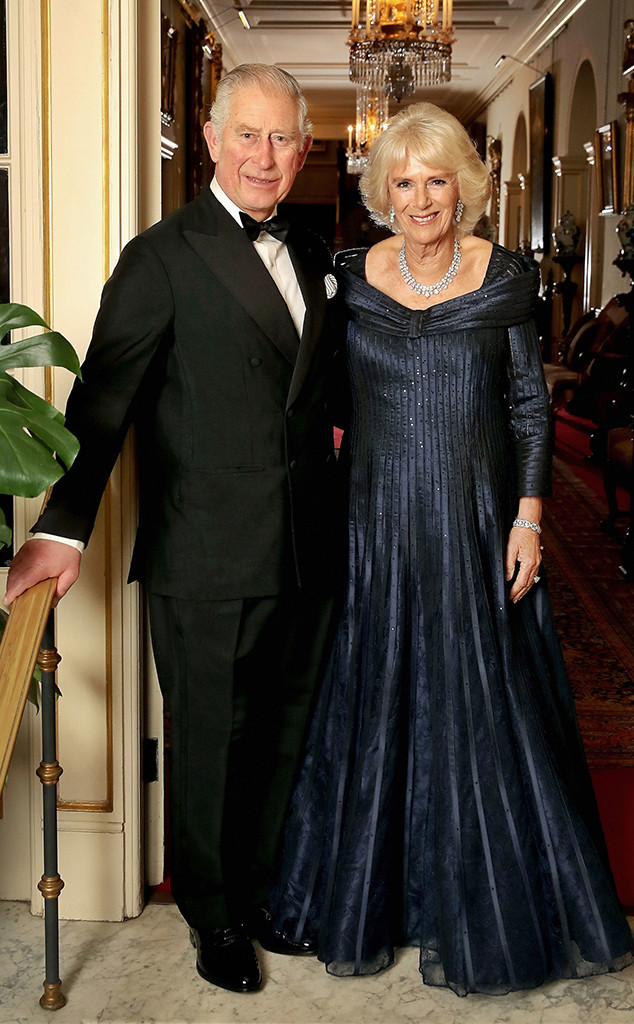
Chris Jackson/Clarence House
“She’s made a massive difference in him,” a longtime royals correspondent told Vanity Fair last year about the duchess’ ongoing effect on the Prince of Wales. “He’s much more relaxed now. They are always laughing and chatting, they have great affection and humor between them.”
That being said, “when she joined the royal family it was a very different situation to the one we see now,” Daily Mail royals correspondent Rebecca English told Victoria Murphy for Town & Country recently. “They decided the way to do it wasn’t to ‘sell her’. They concluded that the best way to move things forward was to just let her be herself and let people see for themselves what she is actually really like.”
Unlike Princess Diana, Charles’ first wife and the wife whom many people still carry a torch for 21 years after her death, Camilla never felt the pressure to be anything other than herself—because she had, in theory, gone off to live her own life by the time Charles proposed to Diana. And by the time she was thrust into the judgmental public eye, first as “the other woman,” the third party in Charles and Di’s marriage; then as his actual girlfriend; and then, at last, his wife—she could be nothing but herself.
Charles was 22 when he first met a 23-year-old Camilla Shand in the summer of 1971, the pair introduced by mutual friend Lucia Santa Cruz. Lucia knew Charles from Trinity College, where she, a few years older, had been working as a research assistant when he first enrolled, and Camilla was then her downstairs neighbor in London.
Camilla’s flatmate at the time was Virginia Carington, whose father, Lord Peter Carington, had just become Britain’s Defense Secretary. Camilla was busy enjoying a rich social life since her official “debut” at 17, and she and Lucia became fast friends.
Camilla had also by then been dating British Army Capt. Andrew Parker-Bowles for the better part of five years. They had met at the cocktail party Camilla’s mother, Rosalind Shand, threw for her daughter’s “coming out” in 1965 and, though Camilla had a boyfriend then, too, she was drawn to the charming officer. When they reunited at a dance in Scotland in 1966, Camilla was down for the count.
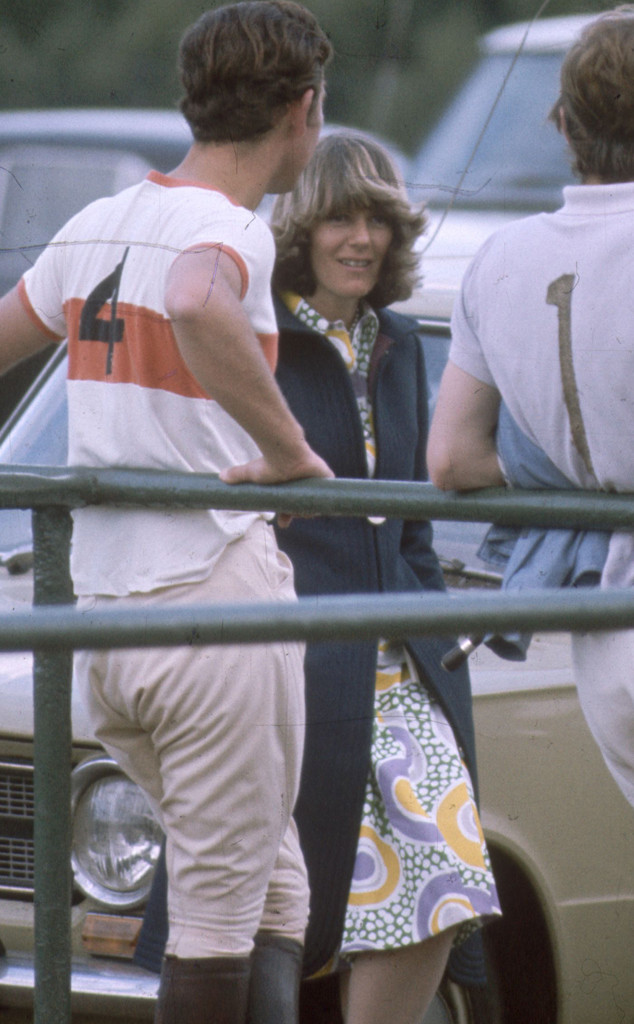
Serge Lemoine/Getty Images
Andrew, meanwhile, already had multiple inroads with the royal family. His parents were longtime friends of Charles’ grandmother Elizabeth, the Queen Mother, and at 13 Andrew was a pageboy at Queen Elizabeth II’s coronation. He also had been an officer of the Household Cavalry, the queen’s official bodyguard, since 1960.
Though more is made of how Camilla’s enduring affection helped Prince Charles come into his own and, eventually, helped repair both of their reputations in the public eye, Charles’ love for Camilla also helped her heal from life’s indignities as well. And his undivided attention was what she deserved after having signed up for a relationship that for years had a big question mark looming over it. Again.
Starting in 1966, Camilla was nuts about Andrew Parker Bowles—country-song-style, at times.
Though she was for all intents and purposes his No. 1 girlfriend, the one who spent cozy country weekends with him and his whole family and all their friends, Andrew loved the ladies and didn’t give them up. One night, according to Penny Junor’s The Duchess, Camilla saw his car parked outside the home of one of her best friends, and she let the air out of his tires and scrawled a message in lipstick across the windshield.
In fact, that’s why Lucia decided to set her up with her pal Prince Charles—she thought her fun, generous, bubbly friend Camilla needed to meet an actually nice guy.
So Lucia arranged for both to come over to her flat one night, and Charles, just returned from a trip to Japan, brought gifts for both ladies.
Though it’s been reported that Camilla’s first words to Charles were, “Oh you know your great grandfather and my great grandmother were lovers. How about it?,” according to Junor it’s Lucia who introduced the pair by saying, “Now you two be very careful, you’ve got genetic antecedents—careful, careful!” (Camilla’s great-grandmother Alice Keppel is said to have been a mistress of King Edward VII—not to be confused with Charles’ great-uncle Edward VIII, who abdicated to marry Wallis Simpson.)
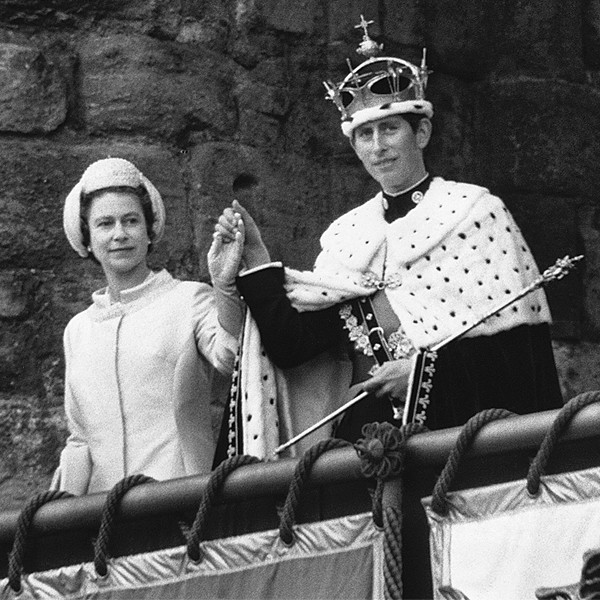
Hulton-Deutsch Collection/CORBIS/Corbis via Getty Images
Either way, Charles may have been a little gobsmacked by the cheeky comment, but he was also instantly charmed by Camilla’s warmth and sense of humor. His own parents, after all, were known for their dry, ribald senses of humor, and Charles—as the whole world would find out down the road—certainly enjoys his share of banter.
Their friendship blossomed immediately, but Charles had just graduated from Royal Air Force College and, though more enthusiastic about being a pilot, was on his way to his father’s alma mater, Royal Naval College at Dartmouth that September. After he graduated from RNC, he was stationed aboard the destroyer HMS Norfolk for nine months.
At the time, the closest father figure in Charles’ life was his great-uncle Louis, Earl of Mountbatten, or Dickie as he was familiarly called. And Dickie recommended to Charles that he sow his royal oats while he could.
But when it came time for a man in Charles’ position to marry, Mountbatten added, “for a wife he should choose a suitable attractive and sweet-charactered girl before she has met anyone else she might fall for…I think it is disturbing for women to have experiences if they have to remain on a pedestal after marriage.”
Hence all that was made years later of a 19-year-old Lady Diana Spencer’s presumed virginity.
So Charles was getting all of this sage advice, but he was also seeing Camilla as much as possible while not busy with his naval duties, sometimes taking her to Mountbatten’s estate, Broadlands, for private time alone.
Camilla and Andrew were still an item, and in the fall of 1972 he and Charles found themselves playing for awhile on the same polo team at Smith’s Lawn, the Guards Polo Club in Windsor Great Park—a welcome opportunity for Charles and Camilla to see even more of each other.
When Charles was about to go on an eight-month tour in the Caribbean aboard the HMS Minerva, he invited Camilla and Mountbatten to tour the ship. Mountbatten thought Camilla was just terrific—but still not a real prospect for his great-nephew, the future king.
But while he was head-over-heels for Camilla, she was still determined to make it work with Andrew—who toward the end of 1972 had taken up with Charles’ sister, Princess Anne, these royal/noble/military social circles apparently only having so big a circumference. Anne knew in the back of her mind that she couldn’t marry Andrew, who was a Roman Catholic (the rule doing away with that barrier wasn’t changed until 2011), but they were serious enough for the queen to invite him to join the family during Royal Ascot week—all of which left Camilla free to enjoy herself, which she was intent on doing, though not to the extent that she considered actually setting herself free.
On his end, Charles didn’t exactly help matters by never explicitly telling Camilla how he felt.
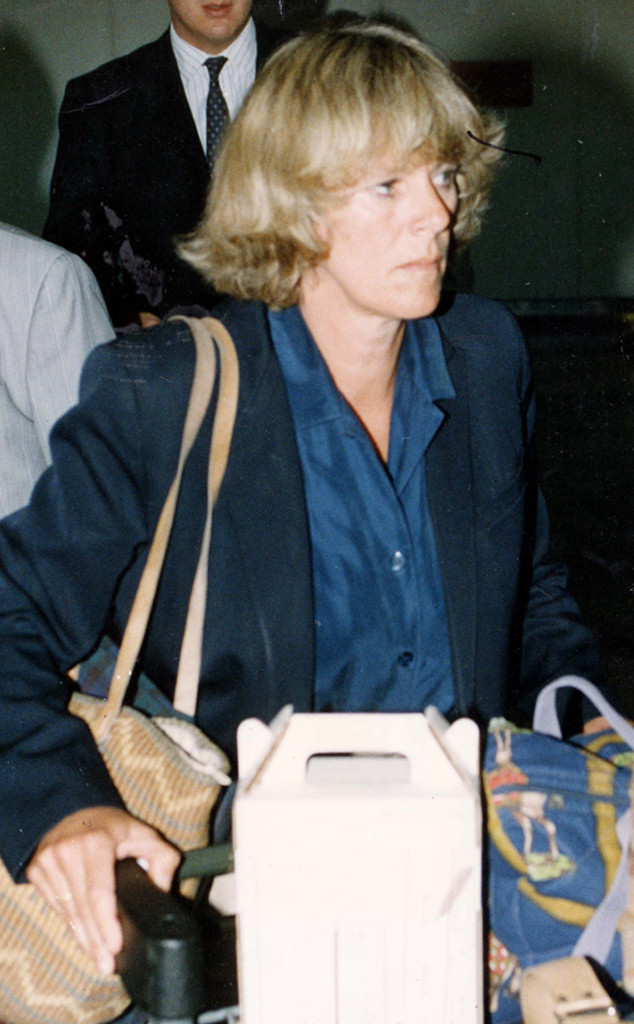
Neville Marriner/Daily Mail/Shutterstock
After Anne paired off for good (at the time) with Mark Phillips, whom she had known for several years from the equestrian circuit, Andrew proposed to Camilla—which, despite her deep affection for Prince Charles, is what she had wanted for almost seven years. (Anne and Phillips didn’t get engaged until April 1973, however, a month after Andrew proposed to Camilla, so it’s ever possible that one decision affected another.)
Camilla wrote to Charles, who was stationed in the West Indies, to break the news.
“I can see I shall have to find myself a wife pretty rapidly, otherwise I shall get left behind and feel very miserable,” Charles, starting to feel abandoned by the most important women in his life, wrote to a friend in the wake of his sister and Camilla’s engagements, per Sally Bedell Smith’s 2017 biography Prince Charles: The Passions and Paradoxes of an Improbable Life.
“I suppose the feeling of emptiness will pass eventually,” he mused.
According to Junor’s The Duchess, Charles pleaded with Camilla a week before her wedding to call it off, but there was no question that she wanted to go through with it.
Camilla was very close to both of her parents, especially her father whom she idolized, Army Major Bruce Middleton Shand. Bruce became a partner in a wine supply business after World War II and later was appointed an officer of the Queen’s Body Guard. Rosalind and Bruce Shand had by all accounts a very happy marriage and Camilla would turn to her father for comfort when her own marriage was on the rocks (and as she was being dragged in the press as the “other woman”).
Growing up at The Laines, the seven-bedroom home in East Sussex where Rosalind and Bruce settled when their eldest daughter was born, Camilla had a messy bedroom and shared a bathroom with her younger sister Annabel (an interior designer who has remained one of Camilla’s closest confidantes). Rosalind was an attentive, full-time mom and Camilla, Annabel and their little brother Mark didn’t have nannies.
Camilla inherited a love of horses and books from their father and an affinity for parties and socializing from both parents, and their house was often full of friends and family. The Shands remained there for 45 years until Bruce moved away following Rosalind’s death in 1994.
For all of the passion she put into her pursuits, especially riding, Camilla was decidedly not interested in going to work, or at least in pursuing a career.
She wanted her mother’s life: husband (preferably a strapping military man), children, country home. In the fall of 1964 she went to finishing school at Mon Fertile in Switzerland, where she skied, worked on her French and learned to be a proper hostess, and then went for an additional polish at the Institut Britannique in Paris.
Camilla told Penny Junor years later that she left Paris with what would be a lasting fear of elevators after getting stuck in one with three other people for seven hours one day. Subsequently, she always prefers to take the stairs.
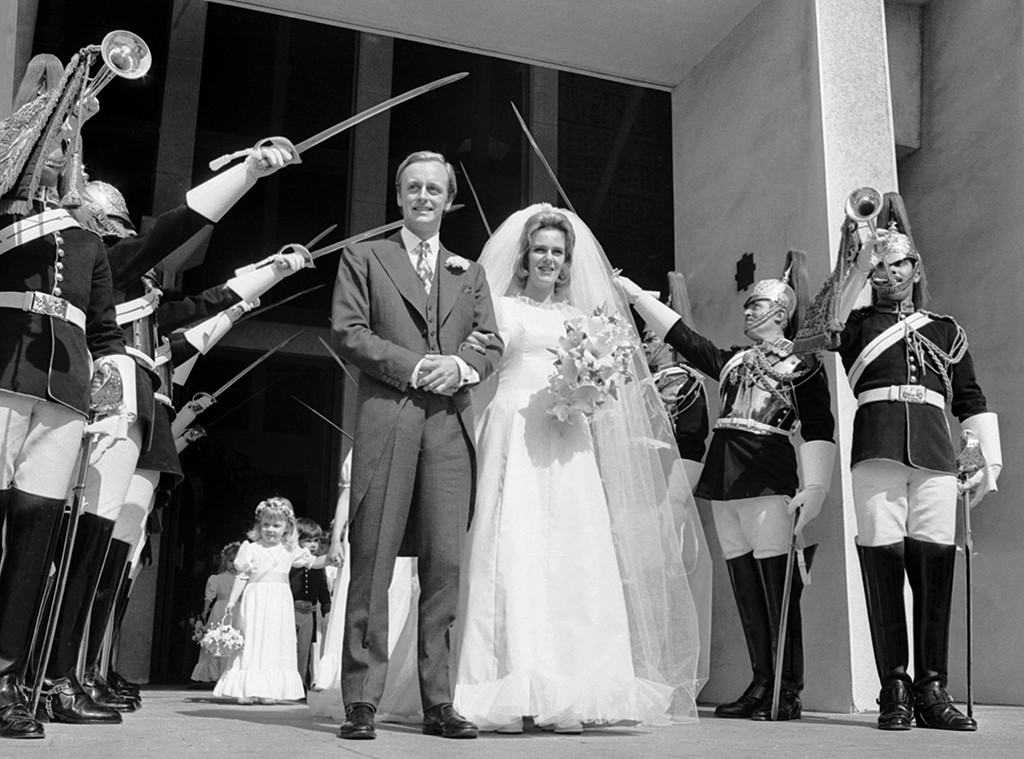
Wood/Express/Hulton Archive/Getty Images
On July 4, 1973, she became Camilla Parker Bowles. She and Andrew had a Roman Catholic ceremony at Guards Chapel at the Wellington Barracks in London. The queen, Princess Margaret, the Queen Mother and Princess Anne all came and sat right up front.
Charles was invited but was still in the Caribbean and he has maintained it wasn’t wounded feelings that kept him away, but rather a commitment to appear in the Bahamas on behalf of the queen.
The newlyweds honeymooned in the south of France, then started hunting for a house in the English countryside to call their own—though Andrew spent most of the week in London working. Bruce Shand had hired him on in the wine business, a move that gave his Rosalind pause, as she thought her son-in-law was a little pompous.
They rented a house near Andrew’s parents, one of whom Camilla felt close to. She and her brother-in-law Nic Paravicini (who married Andrew’s sister Mary Ann) bonded over their love of their father-in-law, Derek Parker Bowles, and their prickly feelings for their mother-in-law, Dame Ann.
Eventually Camilla and Andrew found a home to buy in Wiltshire, 200-acre Bolehyde Manor, not long before they welcomed son Tom on Dec. 18, 1974. Daughter Laura Rose was born on Jan. 1, 1978.
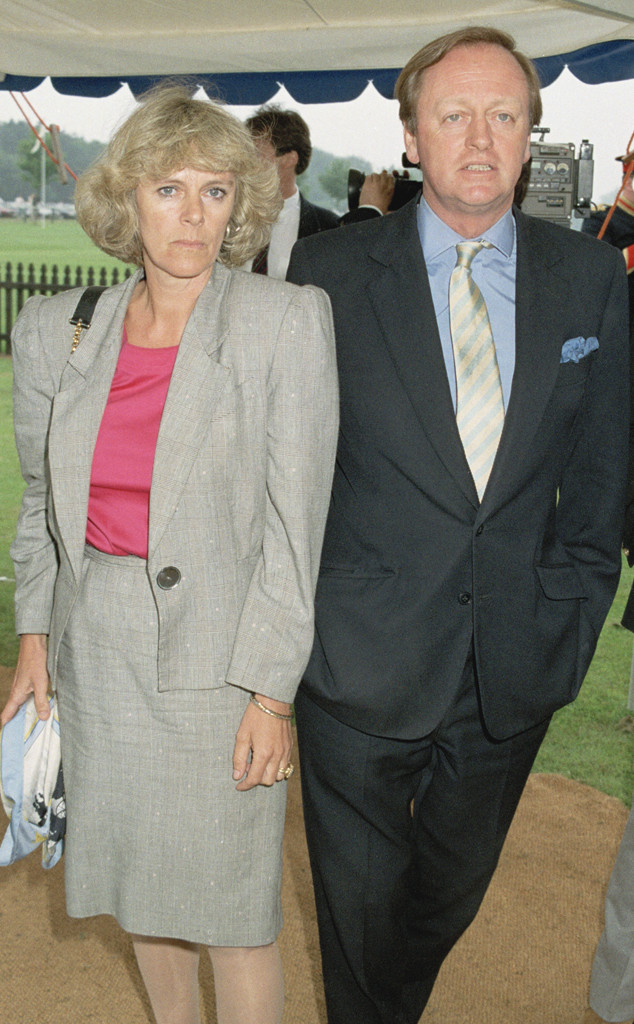
Dave Benett/Getty Images
In the meantime, Camilla had been long since disabused of the hope that her husband would change his ways.
“I’m really hurt, Andrew. I’m the only one of Camilla’s friends you haven’t made a pass at—what’s wrong with me?” one of Camilla’s so-called friends supposedly told Andrew at a dinner party, per The Duchess. Yet while it seemed that everyone in their circle knew what Andrew was up to (in London he and brother-in-law Nic shared a bachelor pad and had a system involving milk bottles left outside the door), he and Camilla remained a dazzling couple at dinner and when otherwise together. Mrs. Parker-Bowles just accepted that her husband’s philandering was part of the deal.
In addition to reading and riding, Camilla turned to gardening to stay sane, and per Penny Junor, she and her friends would laugh at the to-do lists Andrew would leave for her when he’d go off to London for the week.
Camilla was also determined to give Tom and Laura a stable home life, as her parents gave her, so she made it clear she didn’t want to move—as so often military families are compelled to do.
What Camilla didn’t do was find solace in other men.
She did, however, still have a friend in Charles throughout all of this, as did Andrew. The men still played polo together and Charles frequently spent the weekend at their home. They even asked the Prince of Wales to be Tom’s godfather. In turn, the Parker Bowleses hobnobbed frequently with the royal family, Camilla getting along famously with the queen over their love of riding and the outdoors.
Charles, meanwhile, had dated a slew of women, including Dale Tryon, an Australian who adored Charles and in turn loathed Camilla. In 1977 he started seeing Lady Sarah Spencer; a few months later he first met Sarah’s then 16-year-old sister, Diana, at Althorp, the Spencer family home in Northamptonshire.
The prince wasn’t in any rush to get married personally, but he knew it was expected of him. In January 1981, once he and Diana had been courting for a few months, Charles’ father, Prince Philip, the Duke of Edinburgh, advised him to either propose or break up with her—and a bit to his surprise, Charles proposed.
Though Charles and Camilla did not sleep together aboard the royal train the night before Charles married Diana in July 1981, as Diana believed they did, by the beginning of 1979 Charles—mourning his late Uncle Dickie Mountbatten, assassinated by an IRA bomb—had renewed his romance with Camilla, while also seeing other women, including Dale Tryon and Anna Wallace.
“I once heard him on the telephone in his bath on his hand-held set saying, ‘Whatever happens, I will always love you,'” Diana later recalled in tapes she gave to biographer Andrew Morton. “I told him afterwards that I had listened at the door and we had a filthy row.”
Andrew Parker Bowles is said to have not felt a bit threatened, figuring his wife wasn’t actually in love with Charles—and it wasn’t as if Charles, as the future king, was going to marry a divorcée.
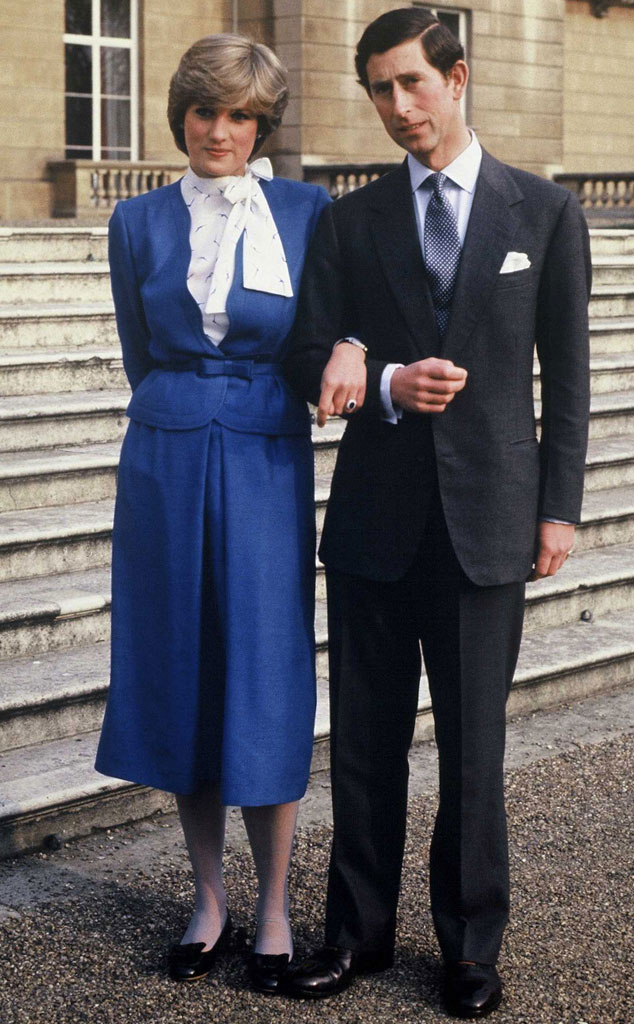
Sipa
Meanwhile, after the engagement was announced, Camilla invited Diana to lunch while Charles was going to be on a trip to Australia and New Zealand, writing to her that she would “love to see the ring.”
According to Morton’s Diana: Her True Story in Her Own Words, Diana later described the lunch as “very tricky indeed,” having come to believe that Charles and Camilla has joined forces to try to put her at ease from the beginning. Again, Charles didn’t help matters because he never was honest about Camilla being an old flame. He just called her a friend.
Inevitably Diana started seeing Camilla all the time, too, including on weekends staying at Bolehyde, in the months leading up to her marriage.
“…I couldn’t understand why she kept saying to me, ‘Don’t push him into doing this, don’t do that,'” Diana said in the Morton tapes. “She knew so much about what [Charles] was doing privately…if we were going to stay at Broadlands, I couldn’t understand it. Eventually I worked it all out and found the proof of the pudding and people were willing to talk to me.”
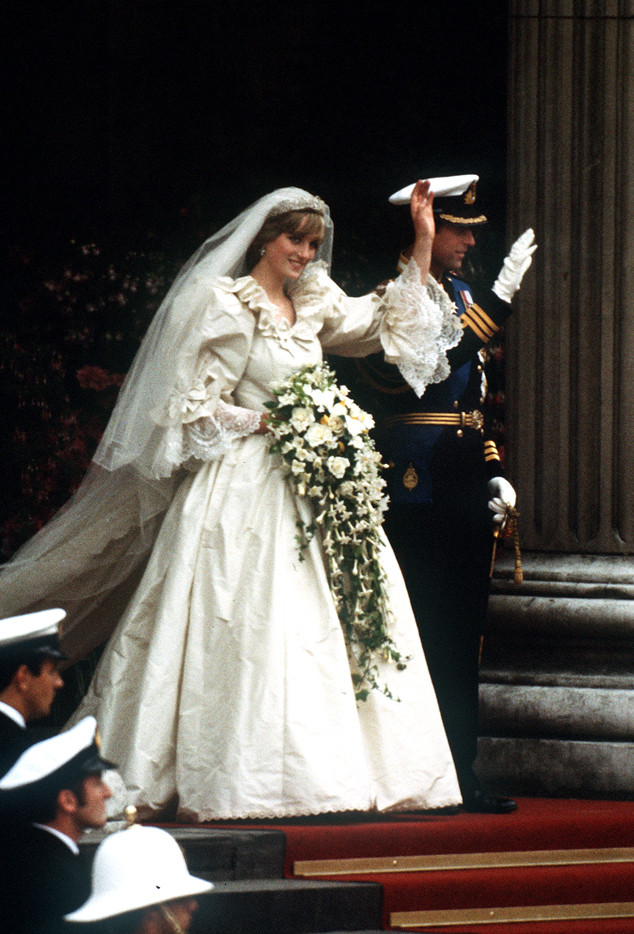
Jayne Fincher/Princess Diana Archive/Getty Images
In turn, Diana was wretchedly jealous of Camilla by her wedding day—though, by then, she was jealous or resentful of almost everyone in Charles’ life. Diana even refused to let Tom Parker Bowles, Charles’ godson, be a member of their wedding party.
Also before their wedding, Charles—a big gift giver—had his top aide buy jewelry for several of his former girlfriends, including Camilla, as a token of appreciation. Diana had become close with the aide, a former Royal Navy officer named Michael Colborne, and found a bracelet intended for Camilla on his desk. She was sick over it.
When she confronted Charles, who was tired of arguing about every little thing, reassured her that he planned to be a devoted husband—which by multiple accounts, he absolutely did.
Camilla, Andrew (on duty withe Household Cavalry, protecting the happy couple) and Tom were at Charles and Diana’s wedding on July 29, 1981.
For the first five years, Charles is said to have remained entirely faithful, phoning Camilla to tell him he was going to be father and sending her and Andrew Christmas cards, but otherwise staying away.
Camilla was going through a transitional period, too, with Tom away at boarding school from the age of 7, as tended to be the custom (although Rosalind Shand ended up renting a flat in London so Camilla could later be a day student at Queen’s Gate as a teen). Tom’s mum turned up at every school function and, back home, drove Laura to all her play dates, parties and lessons.
Camilla and Andrew decided to sell Bolehyde, planning to downsize, and she took it upon herself to show the house to prospective buyers; the property sold for £600,000 in 1985. The couple then moved into Middlewick House, in Corsham. Andrew continued to leave his wife to-do lists to tackle while he was in London.
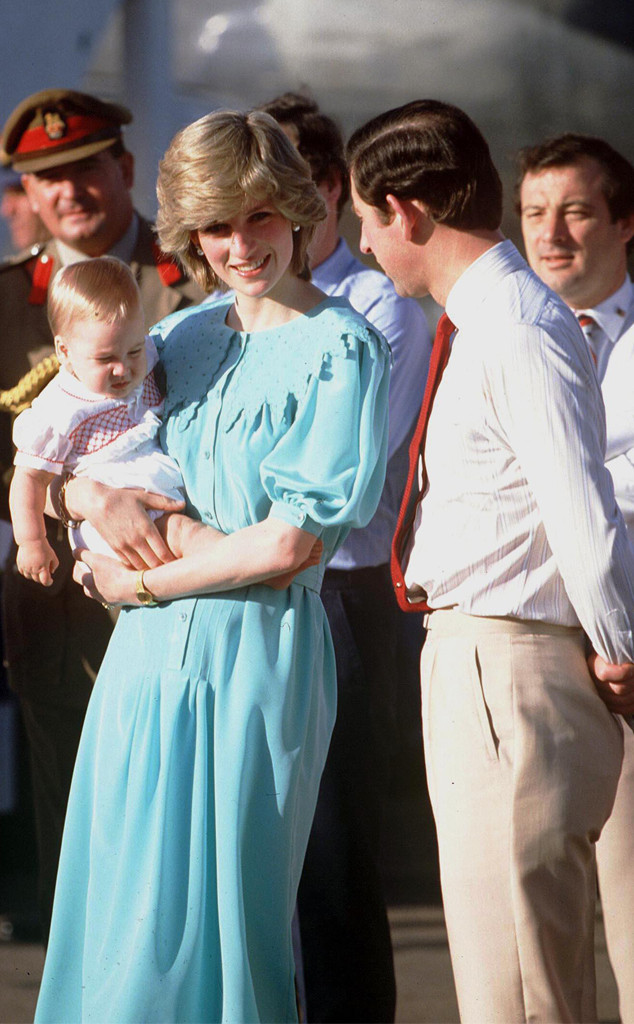
JSH TOUR/REX/Shutterstock
Meanwhile, Charles rejoiced over Prince William‘s birth in 1982 and, despite Diana’s brooding recollections of him wanting a girl, similarly celebrated Prince Harry‘s arrival in 1984.
But according to Diana, what was left of their marriage imploded not long after Harry was born.
According to Junor, Emilie van Cutsem—who along with husband Hugh knew Camilla from past socializing with the Prince of Wales—contacted Camilla to let her know that she was worried about Charles, as did Lady Susan Hussey, a former lady in waiting to the queen who had known Charles since he was 12. Both women felt that the light had gone out of him and Camilla was the only person who could switch it back on.
“I never thought it would end up like this,” Charles wrote in one of his many letters to friends. “How could I have got it all so wrong.” In another he wrote that he couldn’t see the light at the end of “a rather appalling tunnel.”
Junor suspects Camilla reached out toward the end of 1986.

Tim Graham/Getty Images
Royal biographers do not think that Charles ever meant to dupe Diana, and had every intention of staying faithful. The Princess of Wales had already had an affair with cavalry officer James Hewitt, who had been giving her riding lessons.
First it was just phone calls, then both Camilla and Andrew would go for visits at Highgrove, Charles’ country home, when he was there alone. He and Diana were leading increasingly separate lives but put up a still-glamorous facade for the press, as well as did their best to hold it together for William and Harry before their sons inevitably went to boarding school.
It was Diana who eventually tipped off the papers about Camilla being back in Charles’ life, and then Andrew Morton’s book blew the lid off the whole operation when it came out in 1992.
According to Diana, she approached Camilla during a dinner party in 1988 and told her that she knew everything, so there was no need to treat her “like an idiot.”
The princess claimed that Camilla said, “‘You’ve got everything you ever wanted. You’ve got all the men in the world falling in love with you, and you’ve got two beautiful children. What more could you want?'” To which Diana says she replied, “My husband.”

David Hartley/Shutterstock
Up until then, thanks to Camilla and Andrew’s concerted efforts, Tom and Laura Parker Bowles thought they had a perfectly happy family; they also got along great with Charles, whom they had known all their lives.
After the Morton book came out, the queen insisted that Diana and Charles still take a planned trip to Korea together that November. When they got back, Diana made Charles cancel a planned shooting weekend for him, William and Harry and various friends, including Andrew and Camilla. It was an annual trip and the boys were looking forward to it—subsequently, Charles was livid.
That was the last straw, and on Dec. 9, 1992, British Prime Minister John Major announced in the House of Commons that the Prince and Princess of Wales had separated. Their official split followed that of Prince Andrew and Sarah Ferguson and Princess Anne and Mark Phillips earlier in the year.
In January 1993, the Daily Mirror published snippets of leaked phone conversations between Charles and Camilla, the infamous “Camillagate,” or, less delicately, “Tampon-gate,” due to the prince’s expressed desire to “live inside [Camilla’s] trousers or something.” “What are you going to turn into, a pair of knickers?” she joked as they both laughed. “Oh, you’re going to come back as a pair of knickers.”
“Or, god forbid, a Tampax,” he quipped. “Just my luck!” Camilla jested back, “You’re a complete idiot. Oh, what a wonderful idea!”
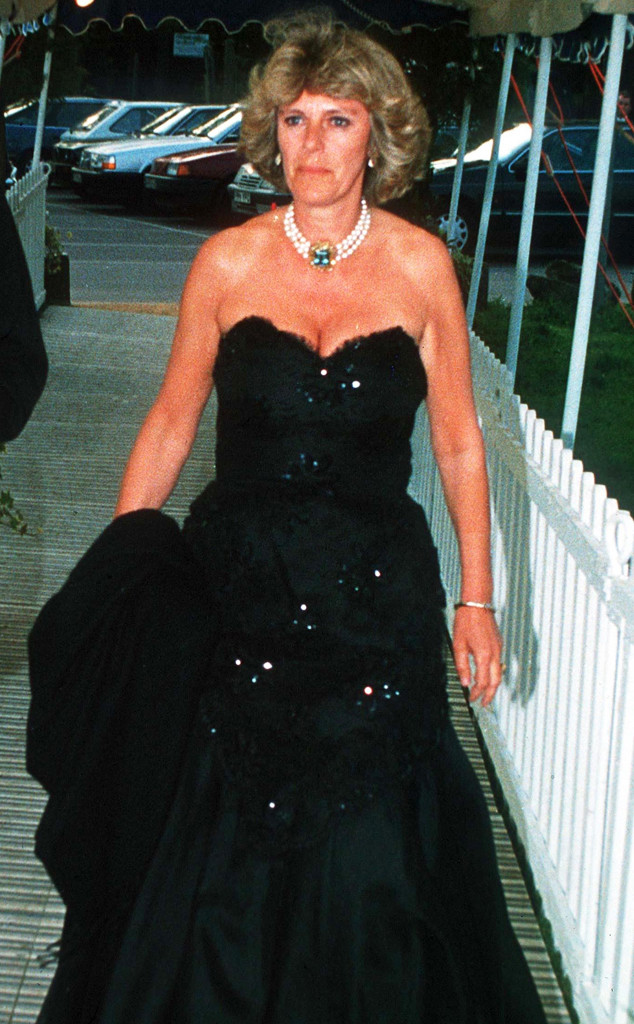
David Hartley/Shutterstock
Though Diana’s infidelity had also been exposed, Charles and Camilla were the villains of this story, as far as most people were concerned.
Camilla was most concerned about her kids, and Tom—who went from Eton to Oxford during that period—would later recall that those were the times when he found out who his real friends were. Like William and Harry, he also got a taste at an early age of what a rabid pack of paparazzi looked like.
“When you were 15 or 16 and you’re coming out of an airport,” Tom said, “and they were really winding you up, all I wanted to do was smack them in the face and beat the hell out of them. But you couldn’t do that.”
It was Charles’ turn to scandalize his parents directly in 1994, when BBC journalist Jonathan Dimbleby’s interview special Charles: The Private Man, the Public Role, featuring unprecedented access to Charles, came out, followed by the book The Prince of Wales: A Biography.
Asked if he intended to remain faithful to Diana, Charles told Dimbleby in the film, “Yes,” then paused. “Until it became irretrievably broken down, us both having tried.”
Charles called Camilla “a great friend of mine…a friend for a very long time. She will continue to be a friend for a very long time.”
After that, Andrew, by then involved with Rosemary Pitman (whose philandering husband Hugh had played polo with Andrew), decided he was done being married to Camilla.
Rosalind Shand had died in July 1994, so Camilla (who would go on to advocate for osteoporosis research and treatment in honor of her mother, who suffered from the condition) was still devastated by that loss when the house of cards came tumbling down. After the funeral Camilla went with her father, sister Annabel, brother-in-law Simon Elliot and a few others to Portugal to decompress. Then, in the wake of the one-two Dimbleby punch, she retreated to Annabel and Simon’s home in Dorset to ride out the headlines.
Andrew and Camilla divorced in January 1995, issuing a statement in which they said outright that had “no expectation that our privacy will be respected.”
Andrew married Rose Pitt in 1996 and they remained together until her death in 2010.
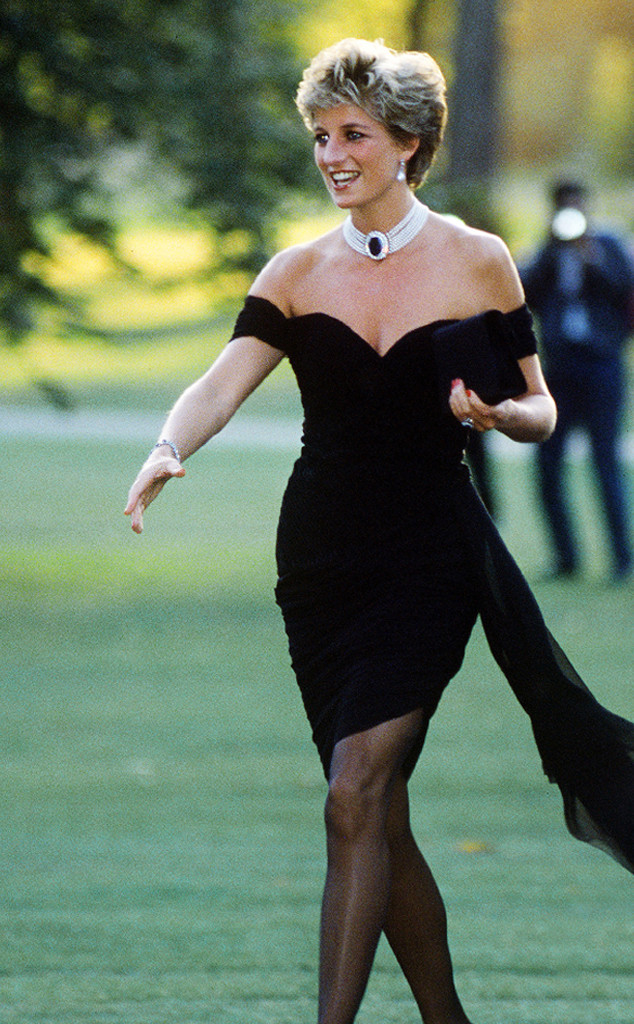
Jayne Fincher/Getty Images
Camilla, however, was adrift in the days after the divorce. The tabloids were relentless, unearthing one “scoop” after another about her and Charles and time they spent together while both were still married. But friends and family, including her beloved dad, rallied around her and tried to keep her occupied. She eventually found a new house, Ray Mill (about 30 minutes away from Highgrove), having sold Middlewick to Pink Floyd drummer Nick Mason. (Camilla still goes to Ray Mill for private country getaways with her kids and five grandchildren to this day.)
All the wounds were made fresh, however, when Diana sat down with Martin Bashir for the BBC’s Panorama in November 1995, the infamous “three of us in this marriage” interview.
Asked what effect finding out about Charles’ affair with Camilla had on her, Diana replied, “Pretty devastating. Rampant bulimia, if you can have rampant bulimia, and just a feeling of being no good at anything and being useless and hopeless and failed in every direction.”
By July 1996, the queen had approved a settlement and Charles and Diana were officially divorced on Aug. 28, 1996.
Then, however, Charles’ office put out a statement saying the Prince of Wales had “no intention of remarrying”—an olive branch to the queen, perhaps, but also the last straw for the prince’s private secretary Richard Aylard, who had also put the Dimebleby interview together.
While that didn’t sit well with Camilla, it’s not as if she had any intention of not being with Charles, and so their relationship continued, and Charles threw her a 50th birthday party at Highgrove in July 1997—what they didn’t know would be the calm before all hell broke loose.
Princess Diana was killed in a car crash in Paris on Aug. 31, 1997, triggering a wave of grief that washed over the U.K. and reached shores around the world. In not addressing the public as soon as possible, the queen may have made one of the few missteps in what has been a lifetime of pitch-perfect behavior, but the monarch’s focus—as well as Charles’—was protecting William and Harry.

Jeff Overs/BBC News & Current Affairs via Getty Images
And because of Charles’ obvious devotion to his boys, it was in the months following Diana’s death that public opinion slowly started to turn in Charles’ favor. No one was singing “he’s a jolly good fellow” just yet, but a mourning populace overwhelmingly approved of the job he was doing with William and Harry, only 15 and 12 when they lost their mum.
But if opinion was slow to turn for Charles, it moved at a glacial pace for Camilla.
The queen and Philip, who had tolerated their son’s affair with Camilla as a “safety valve” that alleviated pressure that could lead to divorce, were not thrilled at first about Charles and Camilla’s not exactly out-in-the-open but no-longer-secret relationship.
In 1998, a series of celebrations were held leading up to Charles’ 50th birthday that November, including a variety show at the Lyceum Theater featuring the Spice Girls and a reception at Hampton Court Palace with about 200 guests. The latter marked Camilla’s first appearance at one of Charles’ official royal engagements—though they were careful not to actually speak in front of people.
Charles’ parents also hosted a party for him at Buckingham Palace, and Camilla was not among the 850 guests invited.
On Charles’ actual birthday, Nov. 14, 1998, Camilla momentously was his date, receiving guests alongside him as hostess, at a party at Highgrove—which his parents and siblings did not attend.
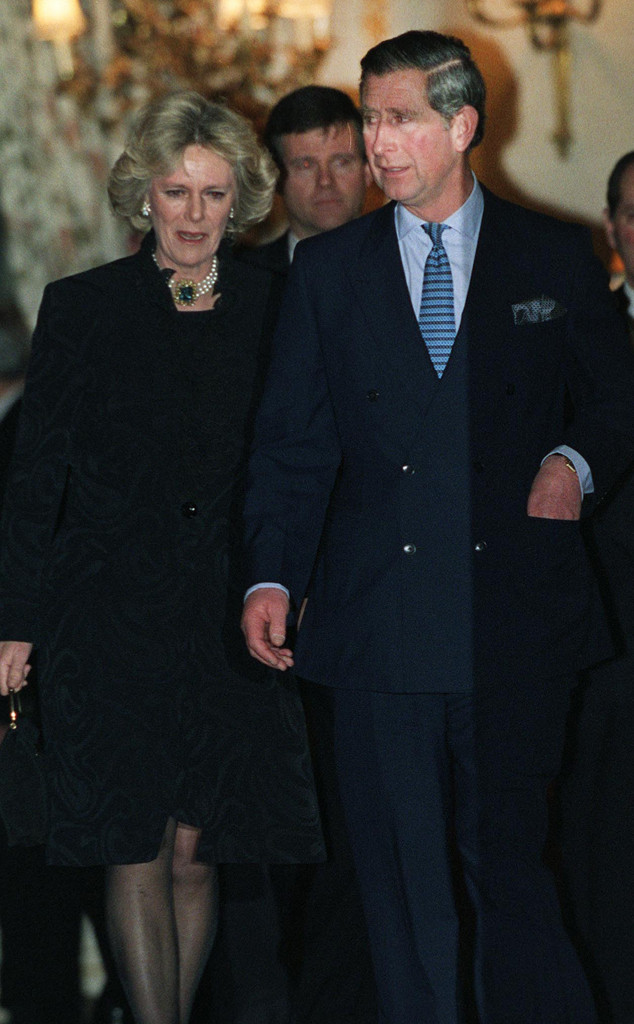
Tim Graham/Getty Images
Their first public appearance together since Diana’s death occurred Jan. 28, 1999, when they were photographed leaving Annabel Elliot’s 50th birthday party at the Ritz in London.
However, Camilla was not among the guests when Charles’ brother Prince Edward married Sophie Rhys-Jones that June. Camilla wouldn’t have any sort of face time with the queen as Charles’ partner until June 2001 when they had a nod-and-curtsy, followed by smiles and small talk, at a birthday party Charles threw for a cousin at Highgrove, their first time socializing since the 1980s.
Camilla didn’t stand with the family but did attend the funeral when the Queen Mother died in 2002. As the years went on, Camilla was generally accepted as Charles’ companion, but she wasn’t making “official” royal appearances.
Charles, like the 1996 statement claimed, didn’t necessarily see himself remarrying. But in the fall of 2004, Camilla was informed ahead of the wedding of Charles’ godson Edward van Cutsem—who was a page boy at Charles and Diana’s wedding, and whose mother Emilie had told Camilla in 1985 that Charles was in a sorry state and needed her—that she would be seated a few rows behind Charles and they would have to arrive and leave separately, because they were not husband and wife.
Camilla, refused to attend—and Charles, agonizing over the decision, didn’t go either.
Instead, it was time to have their own wedding.
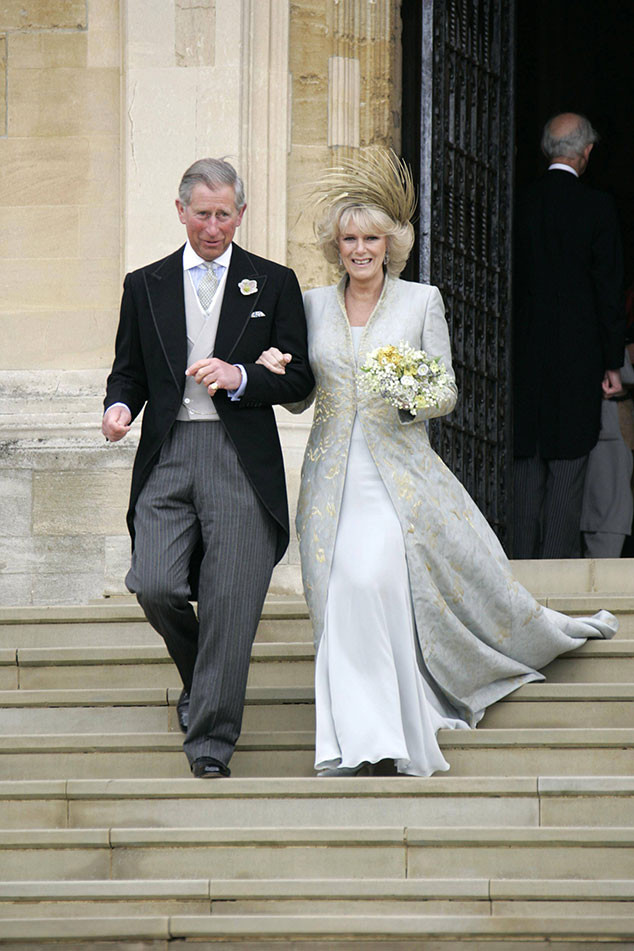
Michael Dunlea/PA Wire
Once Charles felt that William and Harry were truly onboard, plans commenced to get Charles and Camilla to the altar. The bride became Duchess of Cornwall, as well as Duchess of Rothesay in Scotland.
“She’s not the wicked stepmother,” Harry said in 2005. “She’s a wonderful woman and she’s made my father very, very happy.”
Marriage the second time around has been as close to an idyll for Charles and Camilla as it gets.
“As soon as they looked at each other, there was a sparkle in their eyes—that’s when the magic happened,” gushed photographer Alexi Lubormiski, who photographed them for Vanity Fair last fall. “You feel like they are a young couple in love.”
“He’s definitely a more relaxed person since she’s been on the scene,” the Mail‘s Rebecca English told Town & Country. “I think we’re starting to see a bit more of what he’s like in private as well and she’s responsible for bringing that out in him. It’s a side to him that everyone really likes.”
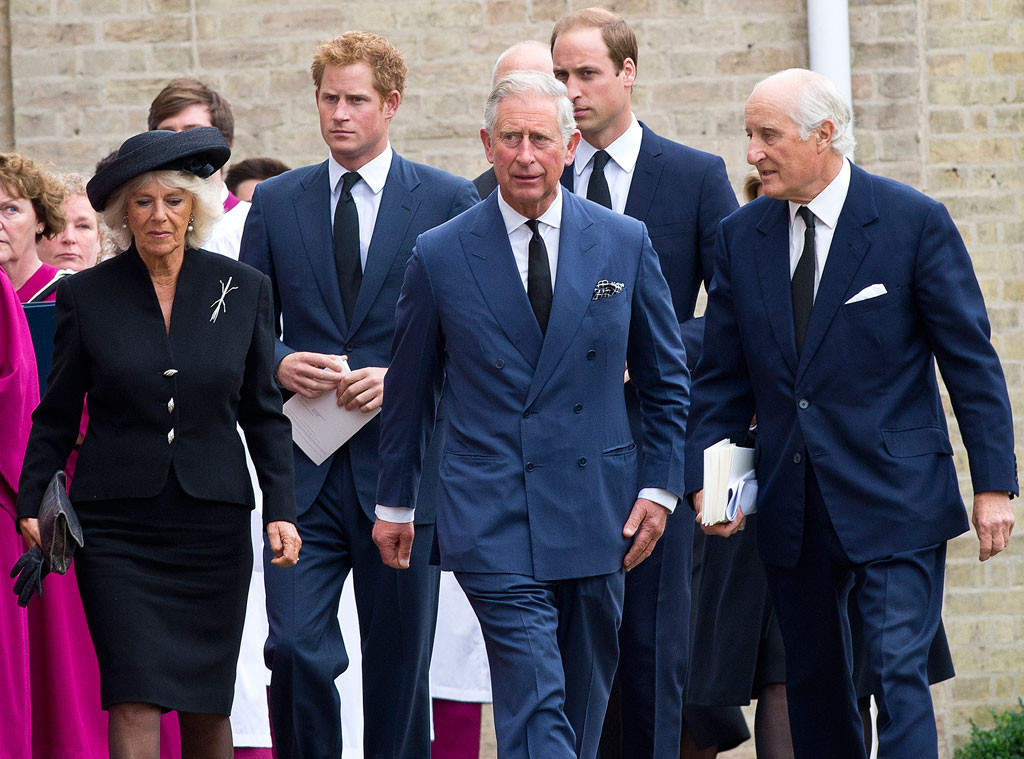
Ben A. Pruchnie/Getty Images
At the time of their marriage, the couple assuaged the still-critical public with word that, one day down the road, Camilla would go by princess consort, rather than queen consort—but the ice has thawed so much that, more recently, there’s been speculation that she will go by queen, as daughter-in-law Kate Middleton absolutely will when William becomes king.
Besides, Camilla is working it like a born royal these days.
In 2016, the queen made her a member of the Privy Council, her highest-ranking advisors. Though it still barely equaled half of Charles’ jam-packed schedule, in addition to being patron or president of more than 90 organizations, she carried out 219 engagements in 2018, including 70 overseas. She and Charles also just made history with a trip to Cuba, becoming the first members of the royal family to ever go there on an official trip. And what worked for Charles nearly 48 years ago did, in fact, end up working for a lot of other people.
“They are both clearly great on their own. But two and two makes five in a big way here,” Camilla’s nephew Ben Elliot told Vanity Fair last fall. “You can see it when they are together. They enjoy each other’s company so much. You can see it best when they are dancing together—such genuine, deep-down affection and love. They both get the giggles—she first, then he tries to hold it together. She knows that he is the boss, the star. She does everything she can possibly do to support him. At the same time, he’s very proud of her. She’s very sharp and perceptive.”
Elliot added about his aunt, “She doesn’t wake up in the morning thinking about what her title will be.”
